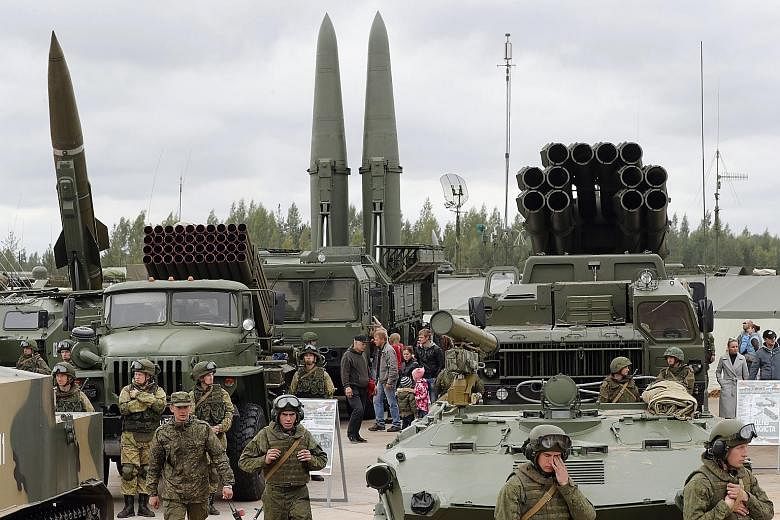ELKO (Nevada)/MOSCOW • President Donald Trump said Washington will exit the Cold War-era treaty that eliminated a class of nuclear weapons due to Russian violations, triggering a warning of retaliatory measures from Moscow.
The Intermediate-Range Nuclear Forces Treaty (INF), negotiated by then President Ronald Reagan and Soviet leader Mikhail Gorbachev in 1987, required elimination of short-range and intermediate-range nuclear and conventional missiles by both countries.
"Russia has not, unfortunately, honoured the agreement, so we're going to terminate the agreement and we're going to pull out," Mr Trump told reporters last Saturday after a rally in Nevada.
Russian Deputy Foreign Minister Sergei Ryabkov said yesterday a unilateral US withdrawal would be "very dangerous" and lead to a "military-technical" retaliation.
Mr Gorbachev yesterday condemned Mr Trump's decision.
"Under no circumstances should we tear up old disarmament agreements... Do they really not understand in Washington what this could lead to?" Interfax news agency quoted Mr Gorbachev as saying. "Quitting the INF is a mistake."
Germany's Foreign Minister, Mr Heiko Maas, said the United States should consider the consequences, both for Europe and for future disarmament efforts.
"The treaty... has for 30 years been an important pillar of our European security architecture," Mr Maas said in a statement yesterday. "We have often urged Russia to address serious allegations that it is violating the agreement. We now urge the US to consider the possible consequences."
-
The weapons ban
-
The 1987 treaty between the US and Russia bans all land-based missiles with ranges of 500km to 5,500km. Missiles that go that far are known as short-and intermediate-range.
The treaty covers land-based missiles carrying both nuclear and conventional warheads. It does not cover air-launched or sea-launched weapons.
The main impetus for the pact was Moscow's deployments of the SS-20 - a mobile, concealable missile that could loft up to three nuclear warheads.
When lifted into a vertical position atop its mobile launcher, the missile stood more than five storeys high.
It terrified the Europeans, and the treaty emerged as a compromise proposal at a historic 1986 summit meeting in Reykjavik, Iceland, where then Soviet leader Mikhail Gorbachev favoured a ban on all ballistic missiles. Then US President Ronald Reagan demurred.
The weapons ban - signed in Washington in December 1987 by both men - resulted in the destruction of 2,692 missiles. Washington demolished 846, and Moscow 1,846.
NYTIMES
The US authorities believe Moscow is developing and has deployed a ground-launched system in breach of the INF treaty that could allow it to launch a nuclear strike on Europe at short notice. Russia has consistently denied any such violation.
Mr Trump said the US will develop the weapons unless Russia and China agree to a halt on development. China is not a party to the treaty and has invested heavily in conventional missiles, while the INF has banned US possession of ground-launched ballistic missiles or cruise missiles of ranges between 500km and 5,500km.
US National Security Adviser John Bolton will visit Moscow today and tomorrow, media reports have said.
Mr Ryabkov, in comments reported by state-controlled RIA news agency, said if the US withdrew, Russia would have no choice but to retaliate, including taking unspecified measures of a "military-technical nature".
"But we would rather things did not get that far," RIA quoted him as saying.
Tass news agency quoted him as saying withdrawal "would be a very dangerous step", and it was Washington and not Moscow that was failing to comply with the treaty.
British Defence Secretary Gavin Williamson, in comments reported by the Financial Times, said London stood "resolute" behind Washington over the issue, and that the Kremlin was making a mockery of the agreement.
Former US president Barack Obama chose not to leave the agreement because of objections from the Europeans and out of concern that it would rekindle an arms race.
"The collapse of the treaty would likely open up a missile race in Europe and elsewhere," said Mr Hans Kristensen, director of the Nuclear Information Project at the Federation of American Scientists, a private group in Washington.
"It would signal a new phase where countries would compete to deploy and counter-deploy weapons."
REUTERS, NYTIMES

